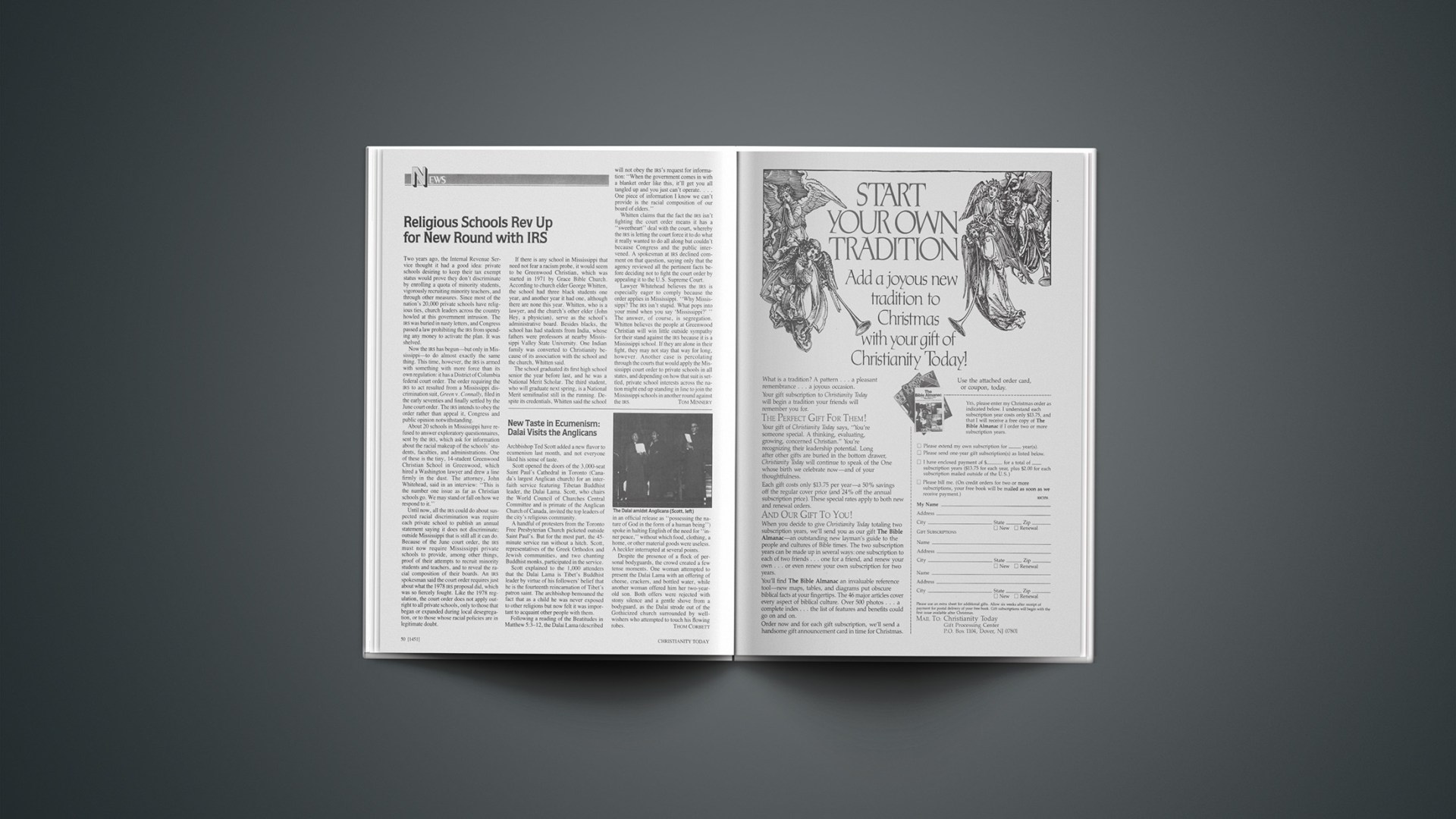Two years ago, the Internal Revenue Service thought it had a good idea: private schools desiring to keep their tax exempt status would prove they don’t discriminate by enrolling a quota of minority students, vigorously recruiting minority teachers, and through other measures. Since most of the nation’s 20,000 private schools have religious ties, church leaders across the country howled at this government intrusion. The IRS was buried in nasty letters, and Congress passed a law prohibiting the IRS from spending any money to activate the plan. It was shelved.
Now the IRS has begun—but only in Mississippi—to do almost exactly the same thing. This time, however, the IRS is armed with something with more force than its own regulation: it has a District of Columbia federal court order. The order requiring the IRS to act resulted from a Mississippi discrimination suit, Green v. Connally, filed in the early seventies and finally settled by the June court order. The IRS intends to obey the order rather than appeal it, Congress and public opinion notwithstanding.
About 20 schools in Mississippi have refused to answer exploratory questionnaires, sent by the IRS, which ask for information about the racial makeup of the schools’ students, faculties, and administrations. One of these is the tiny, 14-student Greenwood Christian School in Greenwood, which hired a Washington lawyer and drew a line firmly in the dust. The attorney, John Whitehead, said in an interview: “This is the number one issue as far as Christian schools go. We may stand or fall on how we respond to it.”
Until now, all the IRS could do about suspected racial discrimination was require each private school to publish an annual statement saying it does not discriminate; outside Mississippi that is still all it can do. Because of the June court order, the IRS must now require Mississippi private schools to provide, among other things, proof of their attempts to recruit minority students and teachers, and to reveal the racial composition of their boards. An IRS spokesman said the court order requires just about what the 1978 IRS proposal did, which was so fiercely fought. Like the 1978 regulation, the court order does not apply outright to all private schools, only to those that began or expanded during local desegregation, or to those whose racial policies are in legitimate doubt.
If there is any school in Mississippi that need not fear a racism probe, it would seem to be Greenwood Christian, which was started in 1971 by Grace Bible Church. According to church elder George Whitten, the school had three black students one year, and another year it had one, although there are none this year. Whitten, who is a lawyer, and the church’s other elder (John Hey, a physician), serve as the school’s administrative board. Besides blacks, the school has had students from India, whose fathers were professors at nearby Mississippi Valley State University. One Indian family was converted to Christianity because of its association with the school and the church. Whitten said.
The school graduated its first high school senior the year before last, and he was a National Merit Scholar. The third student, who will graduate next spring, is a National Merit semifinalist still in the running. Despite its credentials, Whitten said the school will not obey the IRS’s request for information: “When the government comes in with a blanket order like this, it’ll get you all tangled up and you just can’t operate.… One piece of information I know we can’t provide is the racial composition of our board of elders.”
Whitten claims that the fact the IRS isn’t fighting the court order means it has a “sweetheart” deal with the court, whereby the IRS is letting the court force it to do what it really wanted to do all along but couldn’t because Congress and the public intervened. A spokesman at IRS declined comment on that question, saying only that the agency reviewed all the pertinent facts before deciding not to fight the court order by appealing it to the U.S. Supreme Court.
Lawyer Whitehead believes the IRS is especially eager to comply because the order applies in Mississippi. “Why Mississippi? The IRS isn’t stupid. What pops into your mind when you say ‘Mississippi?’ ” The answer, of course, is segregation. Whitten believes the people at Greenwood Christian will win little outside sympathy for their stand against the IRS because it is a Mississippi school. If they are alone in their fight, they may not stay that way for long, however. Another case is percolating through the courts that would apply the Mississippi court order to private schools in all states, and depending on how that suit is settled, private school interests across the nation might end up standing in line to join the Mississippi schools in another round against the IRS.










